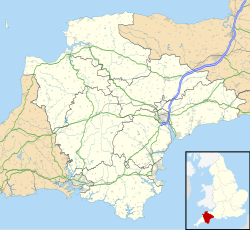This article needs additional citations for verification .(December 2018) |
| Boode | |
|---|---|
 Boode_Road,_Boode. | |
Location within Devon | |
| OS grid reference | SS5038 |
| Civil parish | |
| District | |
| Shire county | |
| Region | |
| Country | England |
| Sovereign state | United Kingdom |
| Police | Devon and Cornwall |
| Fire | Devon and Somerset |
| Ambulance | South Western |
Boode is a small hamlet in North Devon, England. A large dairy farm is situated there. The farm won the Farmers Weekly 'Dairy Farmer of the Year' award 2011.
